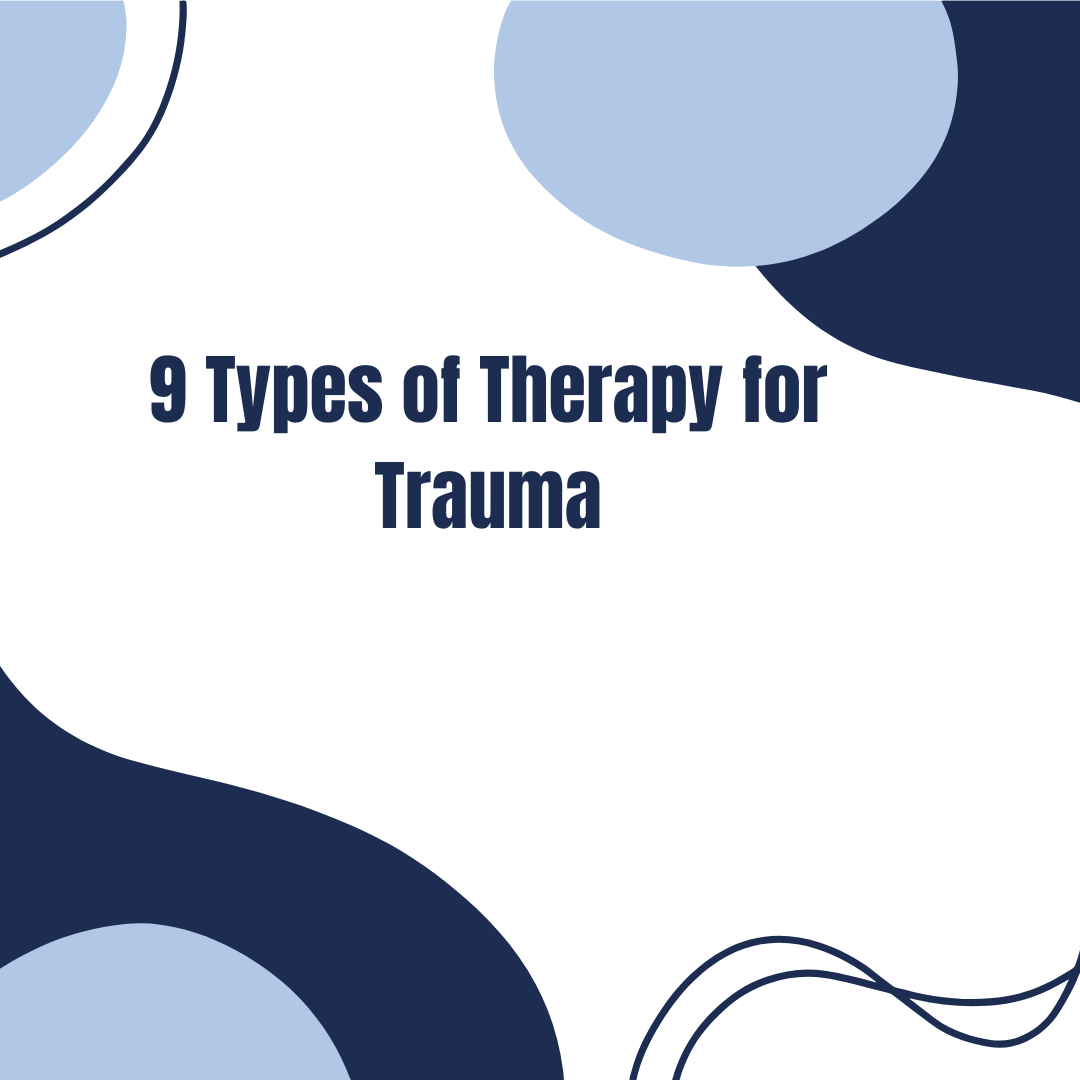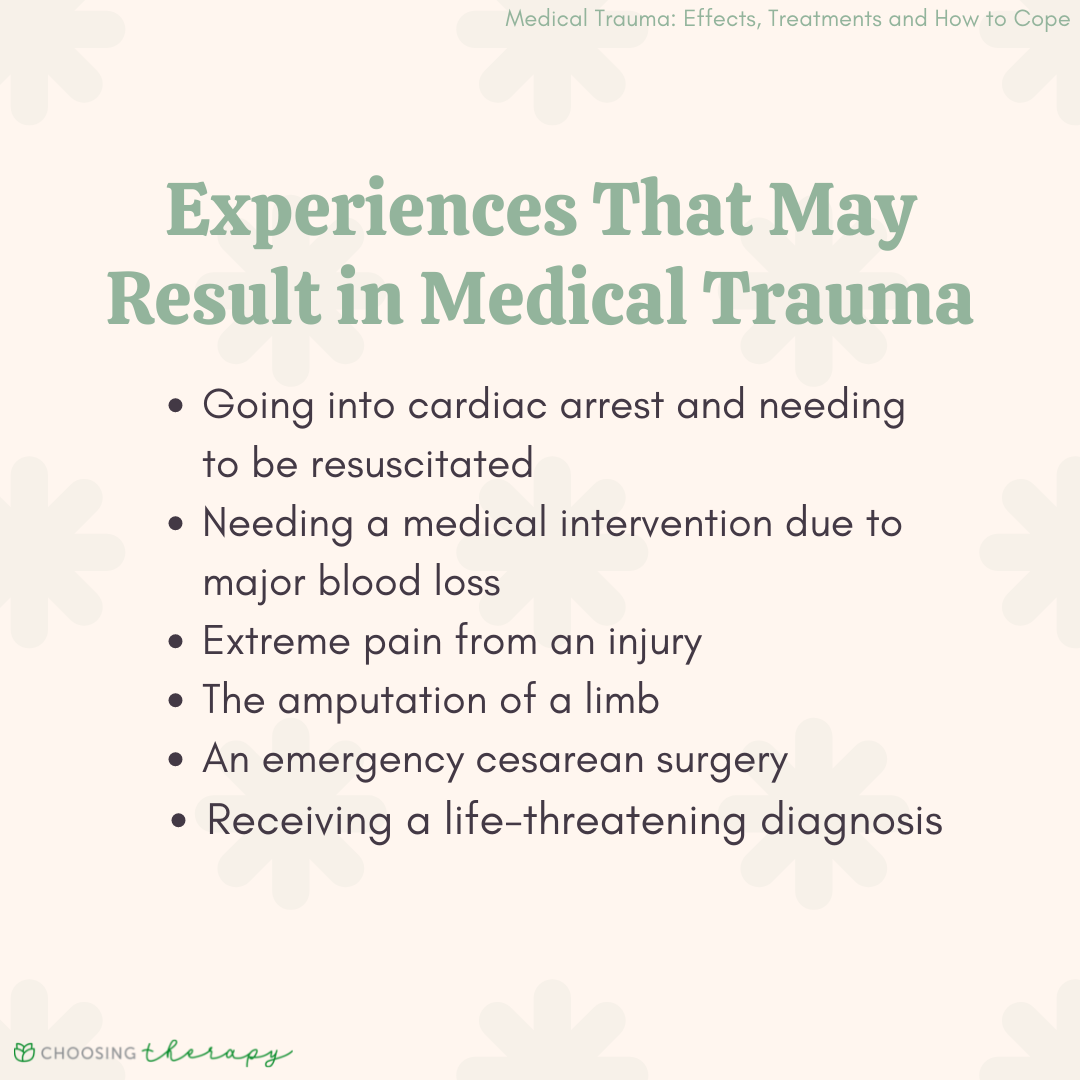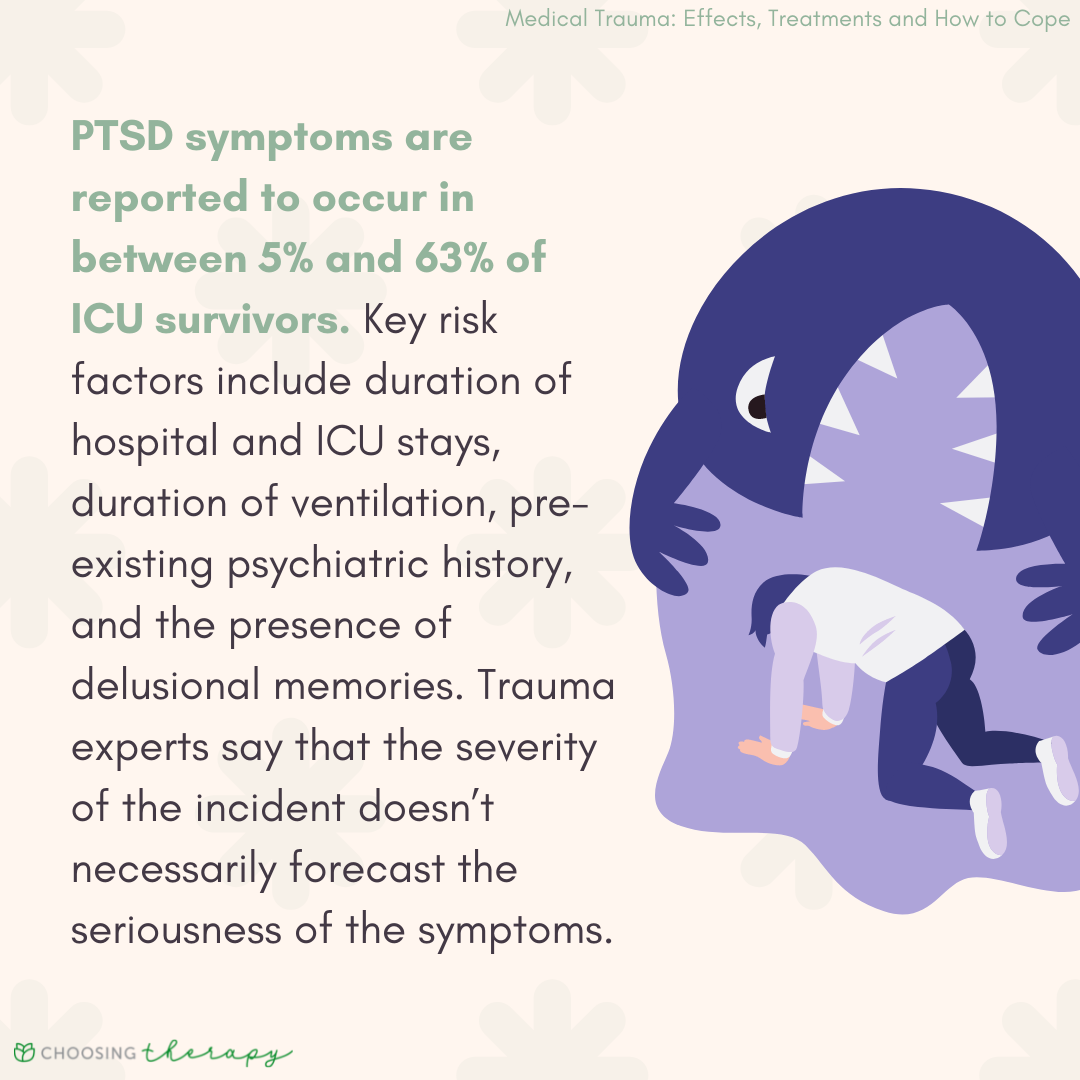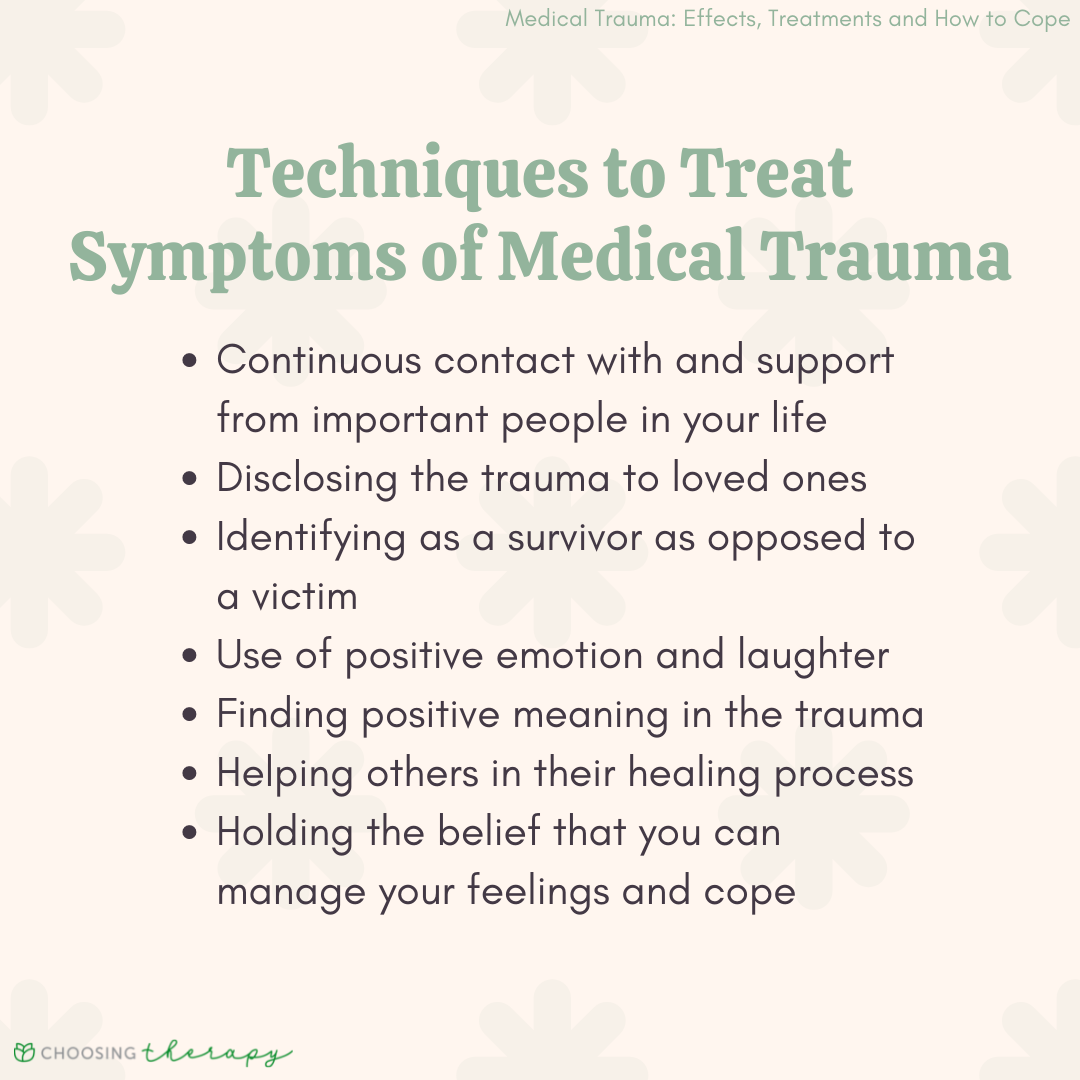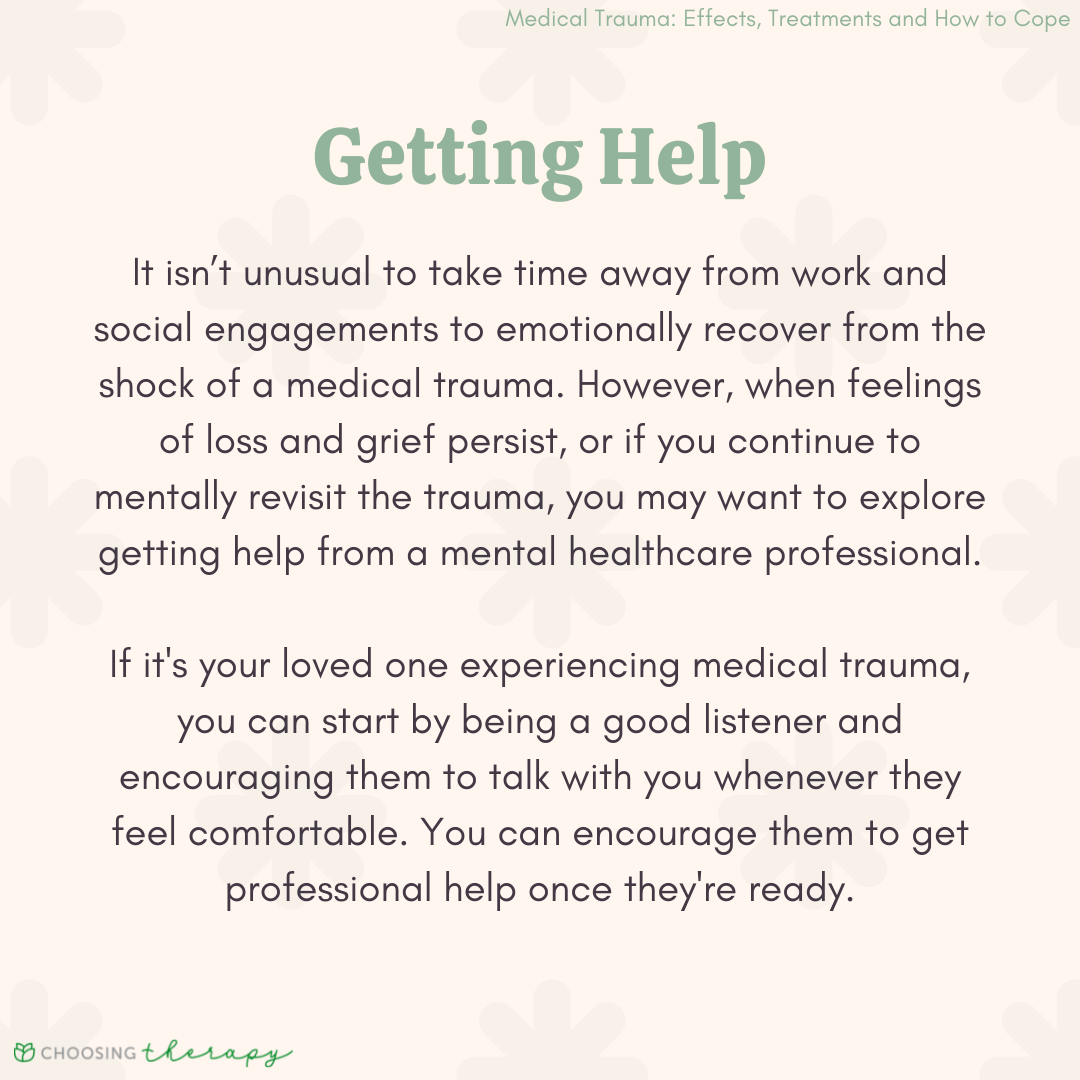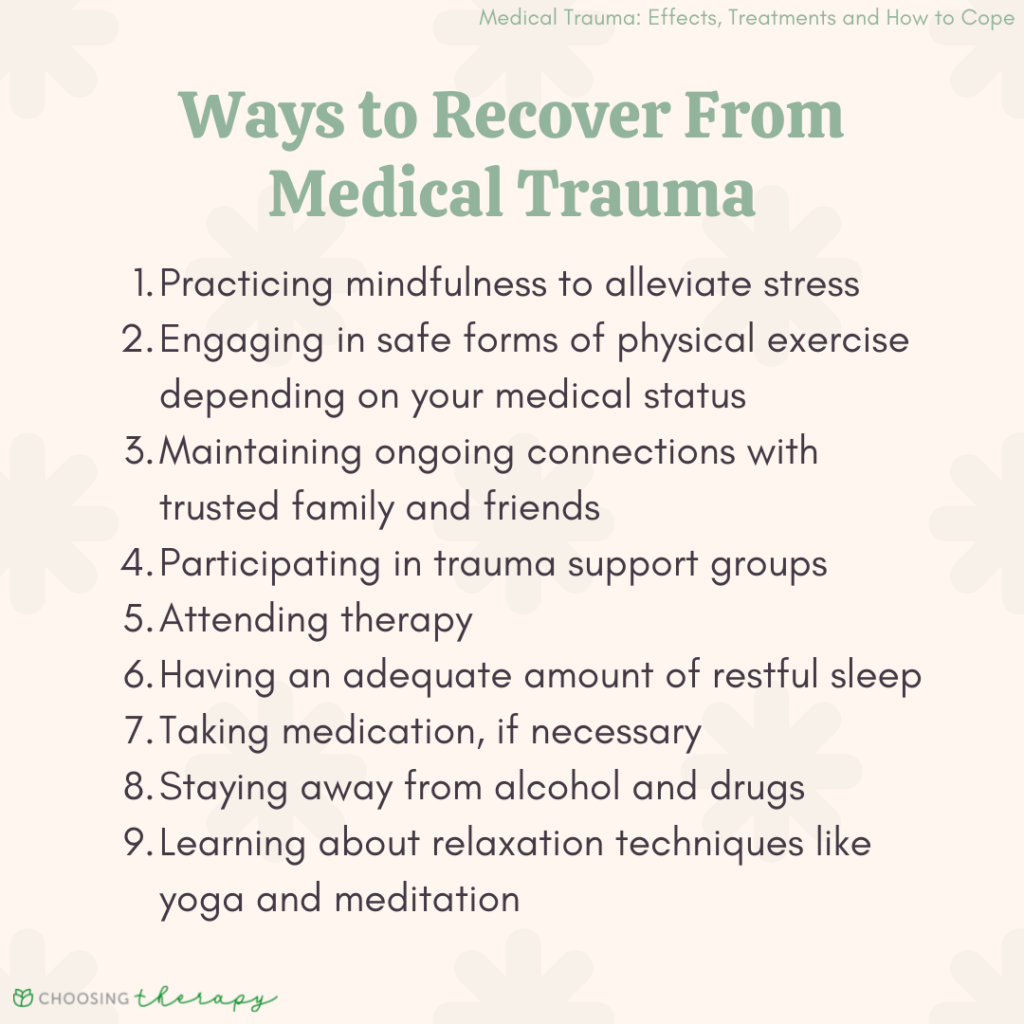Medical trauma is a form of psychological trauma resulting from medical diagnosis or intervention.1 The resulting symptoms can include post traumatic stress disorder (PTSD), depression, anxiety, and disrupted sleep. Through acknowledgement and acceptance — and with the proper treatment from a mental healthcare professional — most people can manage their symptoms and experience full recovery from this kind of trauma.
Recover From Trauma With The Help Of Therapist
Therapy can help you live a better life. BetterHelp provides convenient and affordable online therapy, starting at $65 per week. Take a Free Online Assessment and get matched with the right therapist for you!
What Is Medical Trauma?
Medical trauma is defined as psychological and physiological responses to pain, injury, serious illness, medical procedures, or other frightening treatments.2 People with a pre-existing mental health history associated with trauma or PTSD, or those who have had a frightening experience in a hospital setting/with medical personnel are more vulnerable to experiencing medical trauma.
Note that medical traumas also impact medical personnel and any family or friends who may have witnessed the trauma. This kind of trauma could be particularly prevalent now because of pandemic-related trauma.
Can You Develop PTSD From Medical Trauma?
PTSD symptoms are reported to occur in between 5% and 63% of ICU survivors. In one report, about 1 in 5 patients in an ICU have some level of PTSD. Key risk factors include duration of hospital and ICU stays, duration of ventilation, pre-existing psychiatric history, and the presence of delusional memories.3 Trauma experts say that the severity of the incident doesn’t necessarily forecast the seriousness of the symptoms.
Studies show that risk factors of PTSD for patients in the ICU include:4
- Pre-ICU anxiety or depressive disorders
- Sedation and
- Physical restraint
- Recall of in-ICU nightmares or psychotic experiences
These risk factors are applicable to other hospital settings, too.
Signs of PTSD After Medical Trauma
Here are four signs that PTSD is present after a traumatic medical event:5
- Persistent intrusive thoughts or memories of aspects of the medical event (i.e., replaying the memory of getting the diagnosis)
- Significant distress when confronted with reminders of the medical trauma, including medical appointments
- Disruptions in treatment adherence due to trauma-related avoidance
- Overutilization of healthcare related to hypervigilance
The Lasting Mental Health Effects of Medical Trauma
Trauma experienced as the result of medical procedures, illnesses, and hospital stays can have lasting effects, like developing anxiety and depression. When the medical condition has been successfully treated, that doesn’t necessarily mean that the mental health issues related to trauma will also end.
Those who experience medical trauma may also develop:
- PTSD
- Anxiety
- Depression
- Complicated grief
- Somatic complaints
Symptoms and responses to medical trauma are comparable to other types of physical trauma like being in an automobile crash or experiencing physical abuse. The Anxiety and Depression Association of America (ADAA) says the difference between PTSD and the experience of trauma is that a traumatic event is time-based, while PTSD is a longer-term condition where one continues to re-experience the event and have flashbacks.6
Help For Trauma / PTSD
Talk Therapy – Get help recovering from trauma from a licensed therapist. Betterhelp offers online therapy starting at $60 per week. Free Assessment
Online PTSD treatment – Talkiatry offers personalized care from psychiatrists who listen and take insurance. Get matched with a specialist in just 15 minutes. Take our assessment
What Causes Medical Trauma?
It’s important to note the situations or circumstances that are linked with medical trauma, such as having an extended or terminal illness, a traumatic birth, a heart attack, or any medical issue that puts someone into the intensive care unit.
Traumatic Birth
Giving birth can come with birth trauma, which impacts almost half of all women who give birth. This type of trauma can impact the mother’s ability to breastfeed and any situations which remind her of the birth. It can also be a factor in decision-making on having future children. When a traumatic birth also results in harm to the baby, it can add on guilt and anger, all of which can compound someone’s response to trauma.
Cancer
Receiving a cancer diagnosis is a traumatic event and can become exacerbated through medical trauma while undergoing treatment. Cancer, due to how difficult of an illness it can be, can be a traumatizing experience to go through, especially if there is no curative treatment or if the treatment options last a long time which require one to undergo aggressive treatments. The prolonged exposure to feeling sick, feeling ill from the treatments, and also the fear of what may come in the future, are all sources of trauma.
Heart Attacks
One in eight people who have a heart attack go on to develop PTSD. This goes to show that the way in which we treat heart attack patients makes a difference. To add, heart attacks are often treated by performing cardiopulmonary resuscitation (CPR), which can be very traumatic as well.9
A Stay in an Intensive Care Unit
ICUs are a scary place and often those in the ICU have gone through a lot of medical trauma. They may have been put on machines like a ventilator which breathes for them, or they may have to have dialysis 3 times a week for proper kidney functioning. These interventions are aggressive and take a toll on the body and mind of the patients. Those who leave the ICU have a stronger risk of developing PTSD.10
COVID
The ongoing pandemic has certainly led to a lot of trauma and medical trauma for everyone dealing with it, living with it, and treating it. PTSD from a covid diagnosis is, what we are learning, a real correlation as there is so much unknown still about this virus and ways to treat it. The ongoing pandemic may be a trigger, as some regions may experience lock down while others may have hospitals that are at full capacity.
Receiving Poor Treatment
Poor treatment by medical professionals can lead to medical trauma. This could include poor patient services, lack of sensitivity, poor communication, contradictory information, and even patient-blaming. It can leave people feeling badly about issues they need help with, which may deter them from seeking help in the future. It can also make them less trusting of others in the future and make it harder to believe that they will get better. All of this can compound medical trauma with each event.
Who Experiences Medical PTSD?
Anyone can experience medical trauma, however there are groups that are more at risk. Those in this group include those who have a history of trauma, a PTSD diagnosis, any other mental health diagnosis, or a history of any kind of abuse. Those who work in combat zones or high risk situations may also be more prone to developing medical PTSD. To add, those who identify as LGBTQI+, women, and people of color are also at a higher risk for experiencing medical trauma.
How to Cope with Medical Trauma
To recover from a medical trauma, it helps to learn about self care options and become more comfortable with yourself, your feelings, and your life post trauma. Taking care of your body also contributes to mental healing and overall wellness.
Here are nine ways to recover from medical trauma:
- Mindfulness: Slowing down the mind and body can help alleviate stress and intrusive thinking. It also helps to keep you in the present moment. Deep breathing exercises are a useful tool in this regard.
- Physical exercise: Exercise is a good way to relieve stress and anxiety. Make sure to consult a physician about the best and safest forms of exercise given your medical status.
- Socialization: There is a tendency for people dealing with trauma to isolate themselves. It may be challenging at first, but maintaining ongoing connections with trusted family and friends can help the healing process.
- Trauma support groups: These sources of strength and community for survivors of medical trauma offer helpful resources and information. They can also help you connect with other survivors.
- Therapy and counseling: Attending therapy with a mental health professional can help heal relationships that are strained by PTSD and promote optimal functioning.
- Sleep: Having an adequate amount of restful sleep helps restore the body and mind. Sleeplessness can be a by-product of medical trauma, so this is especially important for people who are trying to recover.
- Medication: If there is ongoing depression, anxiety, sadness, or anger, consult your doctor or a psychiatrist about possible relief with medication.
- Stay away from alcohol and drugs: Drugs and alcohol can increase depression, anxiety, and paranoia. They can also exacerbate trauma symptoms.
- Relaxation techniques: One of the components of trauma is feeling a loss of control over your body, mind, and emotions. Relaxation techniques like yoga, meditation, and slow, deep breathing can be invaluable. These practices help people feel more grounded, present, and in control.
Recover From Trauma With The Help Of Therapist
Therapy can help you live a better life. BetterHelp provides convenient and affordable online therapy, starting at $65 per week. Take a Free Online Assessment and get matched with the right therapist for you!
Treatments for Medical PTSD
It’s important that survivors face their trauma rather than flee from it. Specific techniques can help limit long term symptoms and give people a sense of control. Different types of therapy can also help people come to terms with their medical trauma and manage any resulting anxiety, anger, and fear of doctors and medical settings.
Types of therapy used to treat medical trauma include:
- Eye movement desensitization and reprocessing (EMDR): EMDR was designed to help people overcome trauma and the resulting stress, anxiety, anger, and depression. Eye movements are used to track the therapist’s hand moving back and forth in the patient’s field of vision. Sound might be used as well. The goal is to remove or alter the strong negative emotions associated with the trauma, helping people process traumatic memories in a safe environment.
- Cognitive behavioral therapy (CBT): The goal of CBT is to understand, identify, and alter patterns of thinking that create problems and inhibit a person’s ability to function. These negative thoughts are replaced and reframed for more functional behavior.
- Systematic desensitization therapy: The type of treatment uses visualization techniques; however, people are sometimes asked to return to the place of their trauma. The goal of systematic desensitization is to break down the traumatic event into small parts where the patient learns to replace the fearful response with one of control, relaxation, and calm.
How to Get Help for Medical Trauma
It isn’t unusual to take time away from work and social engagements to emotionally recover from the shock of a medical trauma. However, when feelings of loss and grief persist, or if you continue to mentally revisit the trauma, you may want to explore getting help from a mental healthcare professional.
Counseling can help you to come to terms with the disruptive emotions that are impeding your ability to understand and cope with medical trauma. If you have a good relationship with your primary care physician (PCP), ask for a referral for a therapist. After all, your PCP should already have a good understanding of your medical history. Another option is to find a therapist in an online therapist directory. Once you’ve found a therapist to work with, get the most out of therapy by preparing for your first therapy sessions.
How to Get Help For a Loved One
There are several ways to offer loved ones support if they’ve experienced medical trauma or medical PTSD, but most importantly, be a good listener. It may take time for them to talk about the trauma or their reaction to it, but when they’re ready, try to listen without judgment. Encourage them to talk with you whenever they feel comfortable, and let them know they’re not alone.
Here are several ways to help a loved one with medical trauma:8
- Identify concrete needs
- Maintain to their usual routine
- Help identify ways to relax
- Face situations, people, and places that remind them of the traumatic event
- Take time to resolve daily conflicts so they don’t build up and add to their stress
- Identify sources of support including family and friends.
- Try not to personalize moments of anger, frustration, or emotional distance post trauma; instead, practice patience and understanding
Final Thoughts on Dealing With Medical Trauma & Medical PTSD
Everyone expresses trauma in their own way, but the first step to recovery is recognizing and acknowledging the struggle. The next step is to accept and understand that additional help may be required. Give yourself permission to ask for help from family, friends, support programs, and healthcare professionals. Doing so will increase your chances of overcoming any residual medical trauma symptoms and moving towards a happier life.
Additional Resources
To help our readers take the next step in their mental health journey, Choosing Therapy has partnered with leaders in mental health and wellness. Choosing Therapy is compensated for marketing by the companies included below.
Online Therapy
BetterHelp – Get support and guidance from a licensed therapist. BetterHelp has over 25,000 therapists who provide convenient and affordable online therapy. Take A Free Online Assessment and get matched with the right therapist for you. Free Assessment
Online PTSD treatment
Talkiatry offers personalized care from psychiatrists who listen and take insurance. Get matched with a specialist in just 15 minutes. Take our assessment.
Treatment For Trauma & OCD
Half of people diagnosed with OCD have experienced a traumatic life event. The chronic exposure to stressful situations, such as ongoing bullying, or an abusive relationship can lead to the development of OCD symptoms. NOCD therapists specialize in treating both trauma and OCD and are in-network with many insurance plans. Visit NOCD
Trauma & Abuse Newsletter
A free newsletter for those impacted by trauma or abuse. Get encouragement, helpful tips, and the latest information. Sign Up
Choosing Therapy Directory
You can search for therapists by specialty, experience, insurance, or price, and location. Find a therapist today.
How Does ERP Help With Intrusive Thoughts? Obsessive compulsive disorder (OCD) is a psychiatric condition marked by the presence of obsessive thoughts, images, doubts, or urges, followed by compulsive behaviors or acts aimed at easing the distress caused by the obsession. While the content of the obsessions can take many forms, they are always repetitive, persistent, involuntary, and intrusive, and they often result in a great deal of anxiety for the person experiencing them. 9 Types of Therapy for Trauma Experiencing trauma can result in distressing and debilitating symptoms, but remind yourself that there is hope for healing. If you or a loved one is suffering from the aftereffects of trauma, consider seeking therapy. Trauma therapy can help you reclaim your life and a positive sense of self. 
